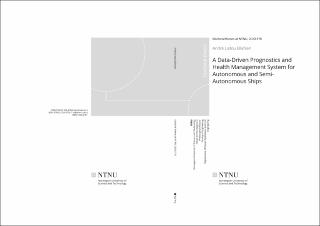A Data-Driven Prognostics and Health Management System for Autonomous and Semi- Autonomous Ships
Doctoral thesis
Permanent lenke
https://hdl.handle.net/11250/2655076Utgivelsesdato
2020Metadata
Vis full innførselSamlinger
Sammendrag
Ship autonomy has been one of the most-sought research objectives at the Norwegian University of Science and Technology in Aalesund for the last three years. Through credible research, we aim to maintain our competitive position in both the global and the Norwegian maritime industry by creating autonomous ships that would operate on the surface of the water entirely by themselves. However, as research has progressed, semi-autonomous ships suitable for commercialization have seemed far more likely. Such ships would require captains, engineers, machinists, technicians, etc., to operate and monitor them, especially in demanding maritime operations, either partly onboard or from a remote control center through a satellite data link. Such ships require reliance on automated systems and belonging sensor devices. Consequently, degradation of such systems during operation poses a serious threat to both profitability and safety since there is less or no crew involvement to perform immediate maintenance operations when needed.
In this context, data-driven prognostics and health management (PHM) has emerged as a promising system solution to utilize the vast amount of sensor devices on board both autonomous and semi-autonomous ships (autoships). Such a system aims to utilize algorithms built on historical sensor measurements to provide automatic data pre-processing, detections of faults, isolation of faulty components, predictions of fault probabilities, and estimations of the progression of already-detected and classified fault-types. Through these actions the system can provide intelligent maintenance recommendations or directions when maintenance operations are needed. In other words, the system can provide decision support or automation to devise an ideal maintenance schedule that eliminates failures. Then, this schedule can be used to optimize maintenance operations for the autoship in the next appropriate port of call.
In recent years, deep neural networks (DNNs) have shown great performances to process large amounts of sensor data in the PHM domain. However, their power is strongly dependent on the accessibility of fault and failure data, but such data is rarely analyzed and collected in the maritime industry. The harsh maritime environment further complicates the accuracy of DNNs. This dissertation’s primary goal is to address these issues, such that both data-driven PHM and DNNs can meet their potential for autoships.
Since both data-driven PHM systems and the utilization of DNNs are in their infancy in the maritime industry in general, the main objective of research is to develop data-driven algorithms. To achieve this, first, the fundamentals of a data-driven PHM system for autoships is proposed. Then, algorithm development for both fault diagnostics and fault prognostics is conducted through three case studies. The development of a fault-type independent fault detection algorithm for maritime components has been of particularly high priority. In addition, both smart data processing solutions and novel DNNs to increase the reliability of fault prognostics are proposed. Complicating this task, fault prognostics have not been fully developed for any application. Furthermore, this dissertation proves the advantage of transferring knowledge obtain from benchmark data of airplane engines to the maritime environment, and more specifically, to marine diesel engines in autonomous ferries. The latter acts as the main case study for this dissertation.
Består av
Paper 1: Ellefsen, Andre; Æsøy, Vilmar; Ushakov, Sergey; Zhang, Houxiang. A comprehensive survey of prognostics and health management based on deep learning for autonomous ships. IEEE Transactions on Reliability 2019 ;Volum 68.(2) s. 720-740 https://doi.org/10.1109/TR.2019.2907402 © 2019 IEEE. Personal use of this material is permitted. Permission from IEEE must be obtained for all other uses, in any current or future media, including reprinting/republishing this material for advertising or promotional purposes, creating new collective works, for resale or redistribution to servers or lists, or reuse of any copyrighted component of this work in other worksPaper 2: Ellefsen, Andre; Bjørlykhaug, Emil; Æsøy, Vilmar; Ushakov, Sergey; Zhang, Houxiang. Remaining useful life predictions for turbofan engine degradation using semi-supervised deep architecture. Reliability Engineering & System Safety 2019 ;Volum 183. s. 240-251 https://doi.org/10.1016/j.ress.2018.11.027 This is an open access article under the CC BY license (http://creativecommons.org/licenses/BY/4.0/)
Paper 3: Ellefsen, Andre; Bjørlykhaug, Emil Dale; Æsøy, Vilmar; Zhang, Houxiang. An Unsupervised Reconstruction-Based Fault Detection Algorithm for Maritime Components. IEEE Access 2019 ;Volum 7. s. 16101-16109 https://doi.org//10.1109/ACCESS.2019.2895394
Paper 4: Ellefsen, Andre; Ushakov, Sergey; Æsøy, Vilmar; Zhang, Houxiang. Validation of Data-Driven Labeling Approaches Using a Novel Deep Network Structure for Remaining Useful Life Predictions. IEEE Access 2019 ;Volum 7. s. 71563-71575 https://doi.org/10.1109/ACCESS.2019.2895394
Paper 5: Ellefsen, Andre; Cheng, Xu; Holmeset, Finn Tore; Æsøy, Vilmar; Zhang, Houxiang; Ushakov, Sergey. Automatic Fault Detection for Marine Diesel Engine Degradation in Autonomous Ferry Crossing Operation. I: Proceedings of 2019 IEEE International Conference on Mechatronics and Automation. IEEE 2019 ISBN 978-1-7281-1699-0. s. 2195-2200 https://doi.org/10.1109/ICMA.2019.8816600 © 2019 IEEE. Personal use of this material is permitted. Permission from IEEE must be obtained for all other uses, in any current or future media, including reprinting/republishing this material for advertising or promotional purposes, creating new collective works, for resale or redistribution to servers or lists, or reuse of any copyrighted component of this work in other works
Paper 6: Ellefsen, Andre Listou; Peihua, Han; Cheng, Xu; Holmeset, Finn Tore; Æsøy, Vilmar; Zhang, Houxiang. Online Fault Detection in Autonomous Ferries: Using Fault-type Independent Spectral Anomaly Detection IEEE Transactions on Instrumentation and Measurement https://doi.org/10.1109/TIM.2020.2994012 © 2020 IEEE. Personal use of this material is permitted. Permission from IEEE must be obtained for all other uses, in any current or future media, including reprinting/republishing this material for advertising or promotional purposes, creating new collective works, for resale or redistribution to servers or lists, or reuse of any copyrighted component of this work in other works
Paper 7: Ellefsen, Andre Listou; Æsøy, Vilmar; Zhang, Houxiang. Real-time Fault Prognostics in Autonomous Ferries: The Advantage of Data Augmentation and Skip Connections
